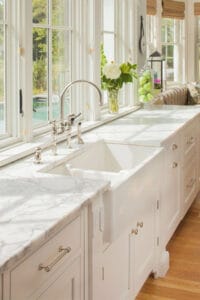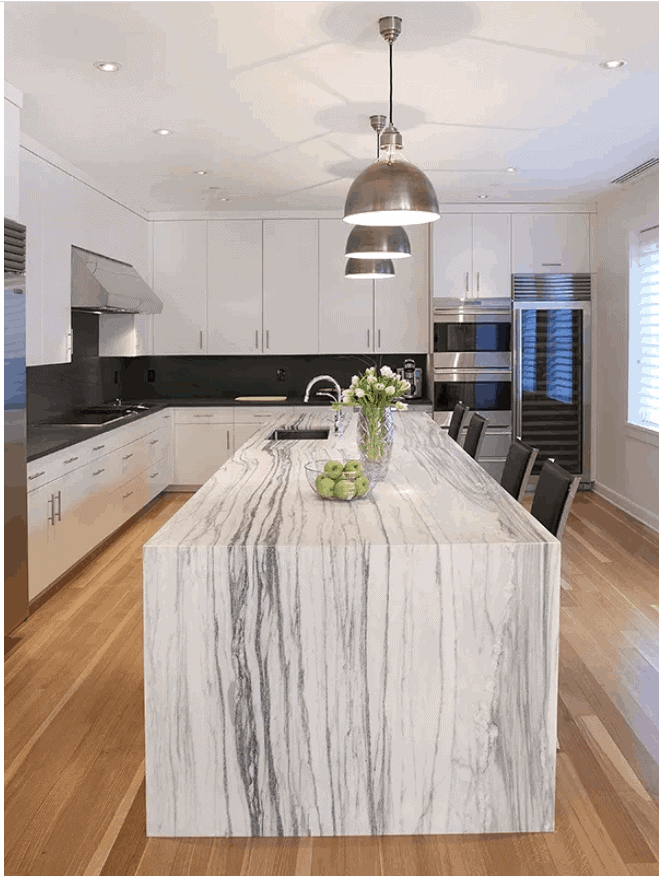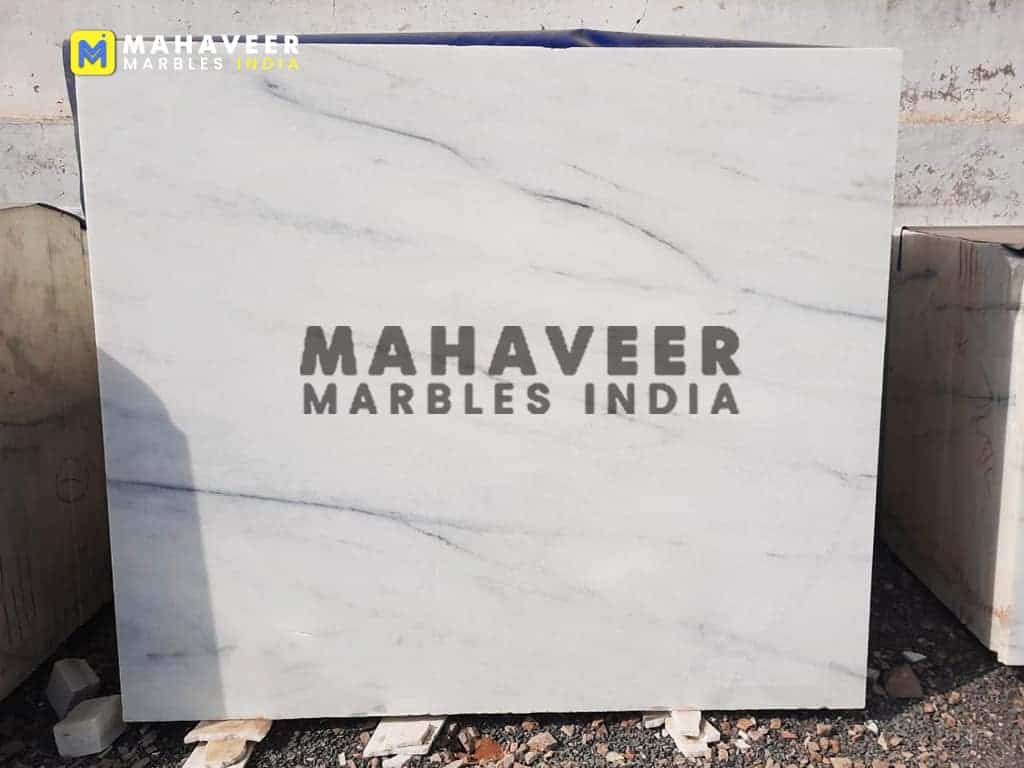Marble countertops can transform a kitchen or bathroom into a luxurious and timeless space. They have the classic look of polished stone, adding elegance and sophistication to any room. Besides being attractive, marble countertops offer numerous advantages that make them a worthy investment. This guide will provide an overview of five key topics about marble countertops – technical aspects, maintenance and care, design and layout, pros and cons, and cost comparison between marble and other countertop materials.
Marble is a natural stone, made up of calcite, dolomite, and serpentine minerals. Its unique features and color variations make it a popular choice for many interior designs. In addition to its beauty, marble countertops are inherently unique, since no two pieces of marble material are identical.
In comparison to other countertop materials such as granite, quartz, soapstone, etc., marble is relatively easy to work with. However, installation requires special tools and techniques, which can have a significant impact on the overall cost of the project.
Here, we will explore the details of marble countertops – from installation to maintenance and design. Let’s dive in!
Technical Aspects of Marble Countertops
Marble countertops are a timeless and luxurious addition to any kitchen or bathroom. The unique properties of marble make it a popular choice for countertops, as it is highly durable, heat-resistant, and naturally beautiful. In terms of size, marble slabs come in various thicknesses, ranging from 0.5 to 1.25 inches. Additionally, most marble slabs come pre-cut in square or rectangular shapes, but some can be specially cut to fit your exact space needs.

When it comes to installation, marble countertops require professional installation with the use of specialized tools. Additionally, you must take proper precautions to ensure that the area where the marble will be installed is level and smooth. Finishing materials such as sealants are used to create an even surface and protect the marble from water damage and staining. Finally, marble countertops are available in an array of colors and patterns, making it easy to find something that complements your unique style.
Maintenance & Care for Marble Countertops
Marble countertops are a beautiful addition to any kitchen or bathroom, but it’s important to know how to take care of them if you want them to last. With proper maintenance and care, your marble countertop will stay looking beautiful for years to come.
Cleaning is an important part of maintenance and care for marble countertops. Regularly wiping down your counters with a mild cleaner will help keep them free from dirt and grime. You should also use a pH neutral cleaning solution to avoid damaging the stone surface, as acidic cleaners can cause discoloration. Make sure to rinse off any cleaner residue thoroughly and dry the countertop after cleaning.
It’s also important to seal your marble countertop every one to two years to protect it from damage. Sealing the marble helps to prevent stains and scratches, as well as provide an extra layer of protection from spills. Make sure to follow the directions on your sealant carefully in order to get the best results.
Polishing a marble countertop once or twice a year can also help keep it looking its best. Polishing marble helps to restore the shine and remove any dullness or discoloration. Again, be sure to follow the directions on your polishing product carefully.
Finally, try to prevent damage from occurring in the first place by using cutting boards when chopping or slicing food and using coasters for glasses and mugs. These simple steps can help ensure that your marble countertop will stay looking beautiful for years to come.
When it comes to creating a luxurious look in the kitchen, marble countertops are an excellent option. They bring a unique beauty and timeless elegance to any space and can be used in a number of design layouts. From simple edge shaping to intricate tile placement, there are many different design options when it comes to marble countertops.
Backsplashes are also a great way to complement the style of your marble countertops. There’s a wide range of materials you can choose from, including brick, ceramic, stone, and glass tiles. You can also combine one or more of these materials for added visual appeal.
When it comes to color, you can find marble countertops in an array of shades and hues. From dark blacks and deep blues to creamy whites and warm yellows, there’s a color to suit any kitchen decor and palette. Depending on the type of marble, the color can range from subtle variations to dramatic shifts.
No matter what design or color option you choose, marble countertops bring a timeless beauty and elegance into every room. With the right maintenance and care, they’ll last you a lifetime.
Pros And Cons Of Marble Countertops
Marble countertops are a popular choice for homeowners who want the luxurious look of a natural stone countertop. Before making this decision, it’s important to be aware of the pros and cons associated with marble countertops.
Pros
- Marble countertops add value to homes due to their luxurious appearance.
- They are resistant to heat, making them excellent for kitchen use.
- Marble countertops are easy to clean and maintain and require minimal sealing.
- They come in a variety of colors and patterns, giving homeowners plenty of design options.
- Marble countertops are extremely durable and can last for decades if properly maintained.
Cons
- Marble countertops are significantly more expensive than other materials such as quartz, granite, and soapstone.
- They can be easily stained or scratched if not properly cared for.
- The installation process for marble countertops is complex and may require an experienced professional.
- Marble countertops are sensitive to acidic substances such as citrus fruits and vinegar.
Considering both the pros and cons of marble countertops can help you make an informed decision about whether or not they are right for your needs.
Cost Comparison of Marble Countertops
If you’re considering upgrading your kitchen counters, marble countertops may be an attractive option to consider. While they are more expensive than some other materials, if chosen strategically, marble countertops can be a great value.
Marble countertops typically cost more than materials such as laminate or ceramic tile. However, comparing them to other natural stone surfaces like granite and quartz reveals that the cost gap is not as vast. How much more you pay for marble over other materials depends largely on the size and shape of your counters, and whether you select pre-cut or custom-cut pieces.

When it comes to cost, it’s important to weigh up the benefits of durability and aesthetic appeal of marble countertops against other materials. For example, quartz countertops are significantly more expensive than marble but have a few advantages due to the fact that they are engineered using crushed quartz and resin, making them non-porous and highly resilient. Granite is also pricier than marble, but can last longer with the proper care.
Ultimately, the choice comes down to personal preference, budget, and lifestyle. Marble countertops are a classic choice that can add value to any home, while other materials may offer more practical features.
Labour Costs
When installing a new countertop, it is important to consider the overall cost associated with labour. Marble countertops are considered to be quite labour-intensive when compared to other countertop materials such as granite, quartz, or soapstone. The process of installing marble countertops typically requires the services of a professional who is experienced in working with this material. The average cost of labour for installing marble countertops can range anywhere from $40-$80 per hour, depending on the complexity of the project and the location.
When compared to installing countertops made of other materials, the cost of labour for marble countertops can be higher. Granite and quartz countertops usually require fewer hours of labor to install, often at a lower cost per hour than marble. Soapstone countertops also require less labour for installation and may be more cost-effective than marble.
It is important to factor in the cost of labour when determining what type of countertop to install in your home. While marble may offer more visual appeal and influence the overall design, budgeting for the additional labour costs must be factored into the total cost of installation.
Expert Tips for Marble Countertops
If you’re considering installing marble countertops, it’s important to know the right tips and tricks from an expert. An experienced professional can help you maximize the beauty and durability of your white marble countertop.
When selecting a marble countertop, try to choose a solid block of stone for a larger surface area. Consider the type of look you’re going for— from polished and glossy to matte and textured. You’ll also need to consider the veins of the marble when selecting. A darker vein will blend better with a darker shade of color.
Preparing your marble countertop is essential for its long-term maintenance. To do this, you’ll need to thoroughly clean, then use a densifier or impregnator to fill in any tiny holes. After that, seal the surface with a protective sealant to protect against staining, scratches, and etching.
Once your marble countertop is installed, you’ll need to follow a few maintenance steps to keep it looking its best. Wipe up spills immediately with warm water and mild soap or a neutral pH stone cleaner. Use a microfiber cloth or soft sponge to avoid scratching the surface. Regularly remove any water spots or soap scum with a slightly abrasive stone cleaner. Lastly, seal the surface every two to three years to ensure its lasting protection.
Following these expert tips can help ensure your marble countertop looks fantastic and stands the test of time.
The beauty of marble countertops can enliven any kitchen or bathroom. Installing them, however, can be a major investment. There are a variety of factors to keep in mind, as well as some common challenges to look out for. This guide will provide an overview of these aspects and provide helpful tips to ensure you make the most of your marble countertops.
The first point to consider when looking at marble countertops is their technical aspects. Marble is a natural stone, which means it varies in size and shape, and depending on the type selected, there may be variations in color and texture. Installation involves cutting to fit and can take time, so it’s important to know what you’re getting into beforehand. Additionally, many types of marble require specific finishing materials and processes to maintain its appearance.
In terms of maintenance and care, marble countertops require regular cleaning and polishing with specialty products. Sealing the marble is also important to prevent staining, scratching, and etching. With correct cleaning and sealing, marble countertops can maintain their beauty for years to come.
Design and layout is another key aspect. Marble countertops can come in various shapes and styles, from circular to square, and can even feature decorative edges. Additionally, tiles or backsplashes can be used to add pops of color and interest.
When it comes to pros and cons, marble countertops offer a unique look and timeless appeal. However, they come with a hefty price tag, require extra maintenance, and are prone to staining and etching.
Cost comparison is also important. Marble is generally more expensive than other countertop materials such as granite, quartz, soapstone, and laminate. However, factors like availability can influence cost as well.
Labour costs need to be considered, too. Installing marble countertops typically requires professional installation, which can raise the cost. Therefore, it’s important to compare labour costs between the different countertop materials prior to purchase.
Expert tips can be invaluable when choosing marble countertops. It is wise to consult with a professional who understand the nuances of marble for advice on selecting, preparing, and maintaining the surface.
To conclude, marble countertops can enhance the look of any room, but they require more maintenance than other countertop materials. Knowing the technical aspects, proper maintenance and care, design and layout options, pros and cons, and cost comparison will help make the best decision for your space. With the right preparation and upkeep, marble countertops can provide a beautiful and timeless addition to any home.
If you would like to explore further and gain more knowledge about marble countertops, there are some helpful resources that are available. Popular home improvement sites have online articles and videos, and home design magazines frequently feature marble countertops in renovation stories. Additionally, the local library or home improvement store may have books and other materials that can be beneficial.
Finally, answering some commonly asked questions related to marble countertops can give comfort and clarity to the decision-making process. Cost, installation, and upkeep are often among the top inquiries. With the information provided in this guide, readers can make an informed choice about the best material for their home.
This guide has covered a variety of topics regarding marble countertops, including their technical aspects, maintenance and care, design and layout, pros and cons, cost comparison, labour costs, expert tips, and helpful resources. We hope that the information provided will help in making an educated decision when considering marble countertops for your home.
Q&A: Commonly Asked Questions About Marble Countertops
When researching countertop materials, it is normal to have questions. Here are some commonly asked questions about marble countertops and their answers:
- Is marble a good choice for countertops? Marble is known to be one of the most aesthetically pleasing countertop materials out there, and can make a statement in any home. While marble countertops require regular polishing and sealing, the advantage of this material is that it is a natural stone, making it one of the most luxurious, timeless options available.
- How much do marble countertops cost? The cost of marble countertops depends on several factors, including size, style, and installation costs. Generally, marble countertops will likely cost more than other countertop materials such as laminate, granite, or quartz.
- Are marble countertops durable? Marble is a very durable material, and can last for decades when properly cared for. However, due to its porous nature, marble is more prone to stains and damage than other materials. Sealing it regularly will help keep it looking great for years to come.
- What should I do to maintain my marble countertops? Maintaining your marble countertops starts with regular cleaning using a mild detergent and warm water. Try to use liquid soap, as it tends to leave less build up. Additionally, marble countertops should be sealed every few years to protect them from stains and other damage. Polishing the countertops every few months will also help keep them looking like new.
Acknowledging the sources used to create a resource guide is important in order to give credit where due. This guide about marble countertops was created with information gathered from a variety of sources. For example, the technical aspects were obtained from industry experts and the maintenance & care tips come from knowledgeable professionals in the field. Furthermore, the design & layout section was enhanced by the input of interior designers who specialize in marble countertops. Lastly, advice and tips for selecting a marble countertop came from local contractors and retailers.
We appreciate the work and knowledge that went into producing this comprehensive guide and would like to thank all those who shared their insights and expertise. This resource guide would not have been possible without their help.

